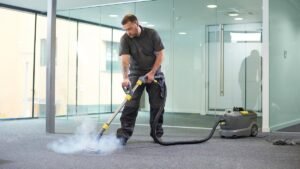Modern Cleaning Techniques and Equipment for Your Company
In today’s fast-paced business environment, maintaining a clean and sanitary workplace is more critical than ever. A clean office not only creates a healthier environment for employees but also makes a positive impression on clients and visitors. With advances in technology and equipment, modern cleaning techniques have evolved significantly. Here’s an overview of the latest trends and tools in commercial cleaning that can help keep your company spotless and hygienic.

Modern Cleaning Techniques and Equipment
Advanced Cleaning Techniques
1. Electrostatic Spraying
Electrostatic spraying is a revolutionary method for applying disinfectants. This technique involves using a specialized device that charges disinfectant particles. When sprayed, these particles adhere to surfaces uniformly, ensuring complete coverage. This method is highly effective for disinfecting hard-to-reach areas and large spaces quickly.
2. UV-C Light Disinfection
Ultraviolet (UV-C) light has proven effective in killing bacteria and viruses. UV-C devices can be used to disinfect surfaces and air in offices, reducing the spread of germs. Portable UV-C units are ideal for quick sanitation of meeting rooms, while larger units can be integrated into HVAC systems for continuous air purification.
3. Green Cleaning
Green cleaning emphasizes using eco-friendly products and practices to minimize environmental impact. This approach involves using biodegradable and non-toxic cleaning agents, reducing water usage, and implementing recycling programs. Green cleaning not only benefits the planet but also promotes a healthier work environment.
4. Microfiber Technology
Microfiber cloths and mops are superior to traditional cleaning materials. They trap more dirt, dust, and bacteria, providing a more thorough clean. Microfiber materials are also durable and require less water and cleaning agents, making them a cost-effective and environmentally friendly option.
5. Steam Cleaning
Steam cleaning uses high-temperature steam to sanitize surfaces. This method is chemical-free, making it safe for various surfaces and reducing the risk of allergic reactions. Steam cleaning is particularly effective for deep-cleaning carpets, upholstery, and grout lines.
Modern Cleaning Equipment
1. Robotic Cleaners
Robotic cleaners, such as automated vacuum cleaners and floor scrubbers, have become increasingly popular in commercial spaces. These devices can be programmed to clean specific areas at designated times, ensuring consistent cleanliness without human intervention. They are equipped with sensors to navigate around obstacles and cover all areas efficiently.
2. High-Efficiency Particulate Air (HEPA) Filters
Vacuum cleaners and air purifiers with HEPA filters are essential for maintaining indoor air quality. HEPA filters trap 99.97% of particles, including dust, pollen, and pathogens, improving the overall air quality in your office and reducing the spread of airborne illnesses.
3. Touchless Dispensers
Touchless dispensers for soap, sanitizer, and paper towels reduce the risk of cross-contamination. These devices are equipped with sensors that dispense the right amount of product without the need for physical contact, promoting better hygiene practices among employees.
4. Carpet Extractors
Carpet extractors are powerful machines designed to deep clean carpets by injecting a cleaning solution into the carpet fibers and then extracting the dirty water. Regular use of carpet extractors can extend the life of your carpets and maintain a clean and fresh appearance.
5. Air Purifiers
Air purifiers equipped with HEPA filters and activated carbon filters are essential for maintaining good indoor air quality. These devices remove contaminants, allergens, and odors from the air, creating a healthier environment for employees.
Implementing Modern Cleaning Practices
To successfully implement these modern cleaning techniques and equipment in your company, consider the following steps:
- Conduct a Needs Assessment: Evaluate the specific cleaning needs of your office space. Identify high-traffic areas, common touchpoints, and any unique requirements based on your industry.
- Invest in Quality Equipment: Choose reliable and efficient cleaning equipment that meets your needs. Consider the long-term benefits of investing in high-quality tools that offer durability and better performance.
- Train Your Staff: Ensure your cleaning staff is well-trained in using modern equipment and techniques. Proper training maximizes the effectiveness of your cleaning efforts and ensures safety.
- Schedule Regular Maintenance: Regular cleaning and maintenance schedules are crucial for maintaining a clean environment. Develop a cleaning schedule that includes daily tasks, weekly deep cleans, and periodic professional cleaning services.
- Promote a Clean Culture: Encourage employees to maintain cleanliness by providing easy access to cleaning supplies and promoting good hygiene practices. Regular reminders and incentives can help foster a culture of cleanliness in the workplace.
Conclusion
By embracing modern cleaning techniques and equipment, your company can ensure a healthier, more productive work environment. Investing in the latest cleaning technology not only enhances the cleanliness of your office but also demonstrates a commitment to the well-being of your employees and clients.
Preferred Cleaning Service uses modern cleaning techniques and equipment such as steam cleaning that removes grime and dirt more efficiently than traditional methods. Through utilizing modern technology and emerging techniques, Preferred Cleaning Service has redefined what it means to be a cleaning company. It has an in-depth
understanding of the practices best suited for each job, and it’s able to flawlessly adapt to meet any requirement.
For additional information
Please visit our Facebook page at https://web.facebook.com/PreferredCS?_rdc=1&_rdr or follow us on Instagram @preferredcs for the latest updates.
